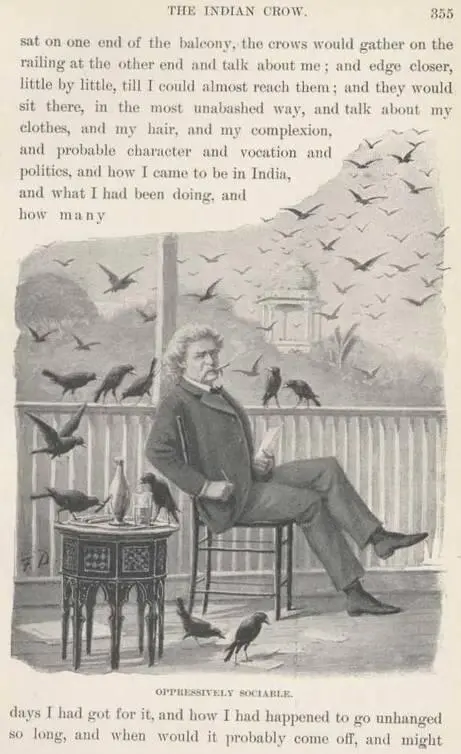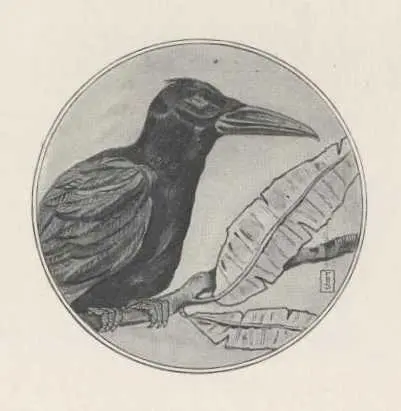Mark Twain - Following the Equator
Здесь есть возможность читать онлайн «Mark Twain - Following the Equator» весь текст электронной книги совершенно бесплатно (целиком полную версию без сокращений). В некоторых случаях можно слушать аудио, скачать через торрент в формате fb2 и присутствует краткое содержание. Год выпуска: 2004, Жанр: Классическая проза, Юмористическая проза, на английском языке. Описание произведения, (предисловие) а так же отзывы посетителей доступны на портале библиотеки ЛибКат.
- Название:Following the Equator
- Автор:
- Жанр:
- Год:2004
- ISBN:нет данных
- Рейтинг книги:3 / 5. Голосов: 1
-
Избранное:Добавить в избранное
- Отзывы:
-
Ваша оценка:
- 60
- 1
- 2
- 3
- 4
- 5
Following the Equator: краткое содержание, описание и аннотация
Предлагаем к чтению аннотацию, описание, краткое содержание или предисловие (зависит от того, что написал сам автор книги «Following the Equator»). Если вы не нашли необходимую информацию о книге — напишите в комментариях, мы постараемся отыскать её.
Following the Equator — читать онлайн бесплатно полную книгу (весь текст) целиком
Ниже представлен текст книги, разбитый по страницам. Система сохранения места последней прочитанной страницы, позволяет с удобством читать онлайн бесплатно книгу «Following the Equator», без необходимости каждый раз заново искать на чём Вы остановились. Поставьте закладку, и сможете в любой момент перейти на страницу, на которой закончили чтение.
Интервал:
Закладка:
It is curious—the space-annihilating power of thought. For just one second, all that goes to make the me in me was in a Missourian village, on the other side of the globe, vividly seeing again these forgotten pictures of fifty years ago, and wholly unconscious of all things but just those; and in the next second I was back in Bombay, and that kneeling native's smitten cheek was not done tingling yet! Back to boyhood—fifty years; back to age again, another fifty; and a flight equal to the circumference of the globe-all in two seconds by the watch!
Some natives—I don't remember how many—went into my bedroom, now, and put things to rights and arranged the mosquito-bar, and I went to bed to nurse my cough. It was about nine in the evening. What a state of things! For three hours the yelling and shouting of natives in the hall continued, along with the velvety patter of their swift bare feet—what a racket it was! They were yelling orders and messages down three flights. Why, in the matter of noise it amounted to a riot, an insurrection, a revolution. And then there were other noises mixed up with these and at intervals tremendously accenting them—roofs falling in, I judged, windows smashing, persons being murdered, crows squawking, and deriding, and cursing, canaries screeching, monkeys jabbering, macaws blaspheming, and every now and then fiendish bursts of laughter and explosions of dynamite. By midnight I had suffered all the different kinds of shocks there are, and knew that I could never more be disturbed by them, either isolated or in combination. Then came peace—stillness deep and solemn and lasted till five.
Then it all broke loose again. And who re-started it? The Bird of Birds the Indian crow. I came to know him well, by and by, and be infatuated with him. I suppose he is the hardest lot that wears feathers. Yes, and the cheerfulest, and the best satisfied with himself. He never arrived at what he is by any careless process, or any sudden one; he is a work of art, and "art is long"; he is the product of immemorial ages, and of deep calculation; one can't make a bird like that in a day. He has been reincarnated more times than Shiva; and he has kept a sample of each incarnation, and fused it into his constitution. In the course of his evolutionary promotions, his sublime march toward ultimate perfection, he has been a gambler, a low comedian, a dissolute priest, a fussy woman, a blackguard, a scoffer, a liar, a thief, a spy, an informer, a trading politician, a swindler, a professional hypocrite, a patriot for cash, a reformer, a lecturer, a lawyer, a conspirator, a rebel, a royalist, a democrat, a practicer and propagator of irreverence, a meddler, an intruder, a busybody, an infidel, and a wallower in sin for the mere love of it. The strange result, the incredible result, of this patient accumulation of all damnable traits is, that he does not know what care is, he does not know what sorrow is, he does not know what remorse is, his life is one long thundering ecstasy of happiness, and he will go to his death untroubled, knowing that he will soon turn up again as an author or something, and be even more intolerably capable and comfortable than ever he was before.
In his straddling wide forward-step, and his springy side-wise series of hops, and his impudent air, and his cunning way of canting his head to one side upon occasion, he reminds one of the American blackbird. But the sharp resemblances stop there. He is much bigger than the blackbird; and he lacks the blackbird's trim and slender and beautiful build and shapely beak; and of course his sober garb of gray and rusty black is a poor and humble thing compared with the splendid lustre of the blackbird's metallic sables and shifting and flashing bronze glories. The blackbird is a perfect gentleman, in deportment and attire, and is not noisy, I believe, except when holding religious services and political conventions in a tree; but this Indian sham Quaker is just a rowdy, and is always noisy when awake—always chaffing, scolding, scoffing, laughing, ripping, and cursing, and carrying on about something or other. I never saw such a bird for delivering opinions. Nothing escapes him; he notices everything that happens, and brings out his opinion about it, particularly if it is a matter that is none of his business. And it is never a mild opinion, but always violent—violent and profane—the presence of ladies does not affect him. His opinions are not the outcome of reflection, for he never thinks about anything, but heaves out the opinion that is on top in his mind, and which is often an opinion about some quite different thing and does not fit the case. But that is his way; his main idea is to get out an opinion, and if he stopped to think he would lose chances.
I suppose he has no enemies among men. The whites and Mohammedans never seemed to molest him; and the Hindoos, because of their religion, never take the life of any creature, but spare even the snakes and tigers and fleas and rats.

If I sat on one end of the balcony, the crows would gather on the railing at the other end and talk about me; and edge closer, little by little, till I could almost reach them; and they would sit there, in the most unabashed way, and talk about my clothes, and my hair, and my complexion, and probable character and vocation and politics, and how I came to be in India, and what I had been doing, and how many days I had got for it, and how I had happened to go unhanged so long, and when would it probably come off, and might there be more of my sort where I came from, and when would they be hanged,—and so on, and so on, until I could not longer endure the embarrassment of it; then I would shoo them away, and they would circle around in the air a little while, laughing and deriding and mocking, and presently settle on the rail and do it all over again.
They were very sociable when there was anything to eat—oppressively so. With a little encouragement they would come in and light on the table and help me eat my breakfast; and once when I was in the other room and they found themselves alone, they carried off everything they could lift; and they were particular to choose things which they could make no use of after they got them. In India their number is beyond estimate, and their noise is in proportion. I suppose they cost the country more than the government does; yet that is not a light matter. Still, they pay; their company pays; it would sadden the land to take their cheerful voice out of it.

PART 5.
CHAPTER XXXIX.
By trying we can easily learn to endure adversity. Another man's, I mean.
—Pudd'nhead Wilson's New Calendar.
God Vishnu, 108 Names—Change of Titles or Hunting for an Heir—Bombay as a Kaleidoscope—The Native's Man Servant—Servants' Recommendations—How Manuel got his Name and his English—Satan—A Visit from God
You soon find your long-ago dreams of India rising in a sort of vague and luscious moonlight above the horizon-rim of your opaque consciousness, and softly lighting up a thousand forgotten details which were parts of a vision that had once been vivid to you when you were a boy, and steeped your spirit in tales of the East. The barbaric gorgeousnesses, for instance; and the princely titles, the sumptuous titles, the sounding titles,—how good they taste in the mouth! The Nizam of Hyderabad; the Maharajah of Travancore; the Nabob of Jubbelpore; the Begum of Bhopal; the Nawab of Mysore; the Ranee of Gulnare; the Ahkoond of Swat's; the Rao of Rohilkund; the Gaikwar of Baroda. Indeed, it is a country that runs richly to name. The great god Vishnu has 108—108 special ones—108 peculiarly holy ones—names just for Sunday use only. I learned the whole of Vishnu's 108 by heart once, but they wouldn't stay; I don't remember any of them now but John W.
Читать дальшеИнтервал:
Закладка:
Похожие книги на «Following the Equator»
Представляем Вашему вниманию похожие книги на «Following the Equator» списком для выбора. Мы отобрали схожую по названию и смыслу литературу в надежде предоставить читателям больше вариантов отыскать новые, интересные, ещё непрочитанные произведения.
Обсуждение, отзывы о книге «Following the Equator» и просто собственные мнения читателей. Оставьте ваши комментарии, напишите, что Вы думаете о произведении, его смысле или главных героях. Укажите что конкретно понравилось, а что нет, и почему Вы так считаете.











